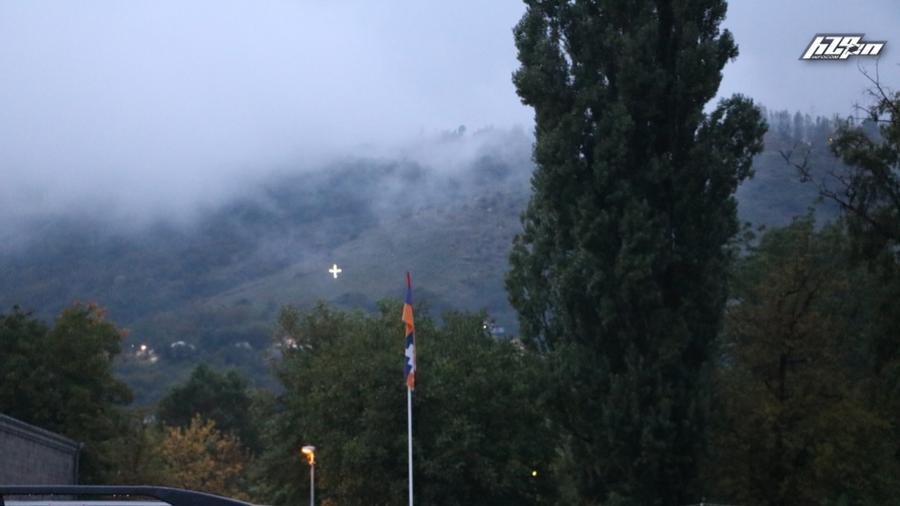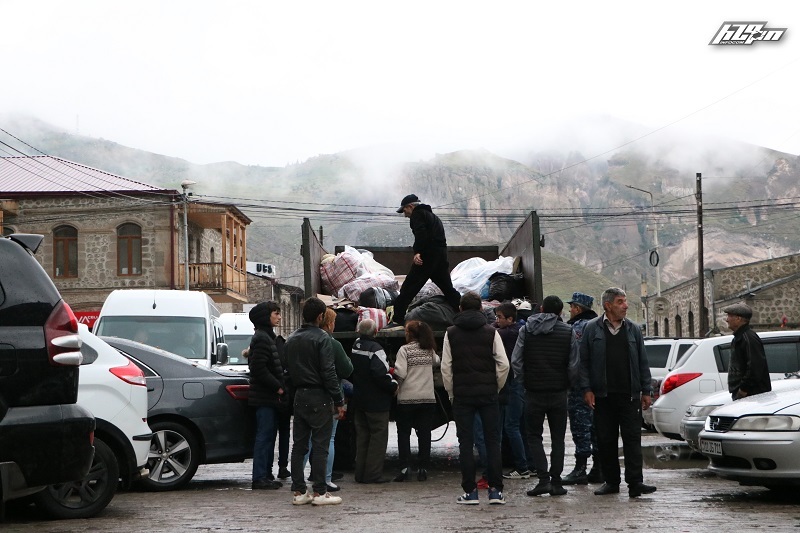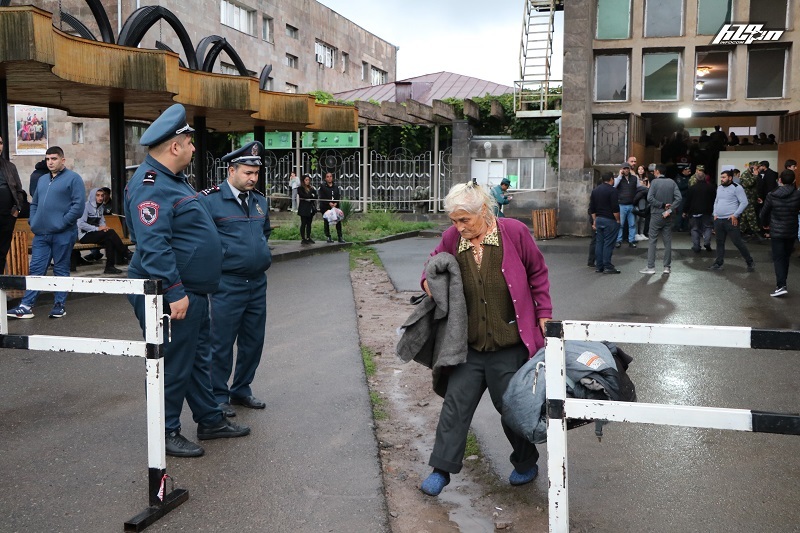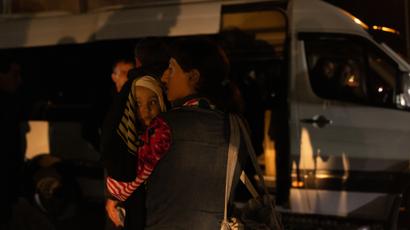
Endless nights and uncertain waiting: Arsakh citizens at the base in Goris
The road from Yerevan to Gori is unusually quiet, especially for us journalists, who always find a topic to "make noise". Now that noise has only one name - Artsakhtsi (Artsakh Armenian), and one address - Artsakh, but words have no meaning, they are not enough.
The intelligible silence is broken by the incomprehensible news coming from official sources every now and then, and the hymns of Sargis, our cameraman, become more heartbreaking with each subsequent news.
- Lord, have mercy! Lord, have mercy!... he sings something that we had to repeat a lot in Goris.
In Goris, there is the gathering station, where the people of Artsakh who were displaced from their homeland to Armenia and registered in Kornidzor, come. They come endlessly, one after another, like the snow that starts suddenly when the flakes fall quickly, get down to the ground, and barely rise.
Now those flakes fall down on our hearts and become stones. They fall down and become heavy forever.

The base of Goris is crowded, and frankly speaking, there is not even enough place to shed a tear. Cold-hearted, we work, photographing people who seem to have put decades of life in a suitcase, packed everything they had wrapped it in cars, rushing here and there, getting on a bus, and hearing the vague voice of one of the organizers.
- People going to Gegharkunik, get off quickly, you will go by another bus.
- Who was going to Vayk? Get on the bus!
People get off, people get on, and the buses take them to their new addresses. People come down, people wait, and who knows how people don't go crazy...
***
I notice a girl standing alone in the uncertain waiting. I approach and ask, are you from Artsakh? She firmly says yes. I ask if she'll agree to speak a few words. She agrees to talk but without cameras.
22-year-old Amalya Arushanyan is a linguist from Haterk village, Martakert region. I apologize for the painful questions and ask her to remember September 19, the day of the last attack of Azerbaijan.
- Would you like me to be as honest as possible? As a citizen of Artsakh, now it is not difficult for me to recall all that because it has already become normal, - says Amalya, and tears are falling from her eyes, - No, I lied, it is difficult.
At the time of the attack, Amalya was at her workplace, at school, and the students told her the news that the enemy had attacked the neighboring villages, but Amalya didn't believe it, she thought it was just another thing that would pass. Then, when the voices reached them, there was nothing left but to go down to the shelter of the school.
"Then our relatives came and took us home, whoever they could, they took them... Then the day came when there were more shootings. My little sister was in a very bad condition, she had health problems... Then night came, during the night the sky was not black at all, it was red because they had organized all this in a very professional way, they were coming from all directions, and our army was in a very bad, disorganized state... Then once the plane hit, we didn't sleep at all that night, there was no communication, and we couldn't find out about our brothers who were on the frontline... All of us were scared and entered the shelter, it was not safe there, nowhere was safe. The morning light never came for us that night, it stayed dark like that."
***
Amalya says the next day, when it was officially reported that an agreement was reached to stop the fire at 13:00 with the mediation of the Russian peacekeeping troops, it did not stop.
"It was after the so-called "ceasefire" that I lost my brother, whom we forcefully brought here to take with us so that his grave does not remain there," she says, holding back the tears.
- Lord, have mercy! Lord, have mercy!
***
The day after the attack, Amalya was transferred to Stepanakert. I asked if she was with her whole family. "With all my relatives," she answered.
"We went to the airport, where the Russian base is located, thinking that we were close to the Russians there, there would be no attack, but the military base is near the Askeran regiment, they were also attacking the Askeran military unit there, we were still afraid, but already kind of indifferent. it was fear without emotion, we had already got used to it, do you get it?" she says, looking at me with eyes as green as the mountains of Artsakh and filled with water.
And I don't know where to look when everywhere you turn, it's the same tragedy.

The family stayed at the airport for 2 or 3 days, Amalya says it seemed like a long time, but she doesn't remember clearly.
"There was constant news that it's over or that someone was slaughtered in the village, that azeris have entered, put up the flag... You know, that desperate situation where you can't get in touch with anyone... It was only in the area of the military base that there was a connection, thanks to the Russians. There was no light at all in Stepanakert... That uncertain situation was generating both truth and lies."
The next day, when the fire really stopped, the Arushanians decided not to return to the village. "No one wanted to go back, enter Haterk, or stay in the territory of Artsakh, because that is suicide or voluntary slavery," she says.
"It was very common for us at the checkpoint, we saw both Turks, Russians, and Armenians. They didn't thoroughly and deeply examine the car. As far as I know, they didn't look at the documents. They opened the door and looked, and that's it. Maybe there was actually a device there. I don't know if he was checking," Amalya says, adding that she heard that the group is thoroughly checked when a weapon is found with one of the people.
The family barely took food, clothes, and beds with them, but there are people, says Amalya, who didn't make it or didn't want to. "For example, my grandmother, an elderly woman, has seen a lot in her life. She said: "Why am I taking it, what should I do? Last time, during the 44-day period, I took my clothes and shoes, what happened?"
Amalya says, in any case, she doesn't remember her home in a sad way . She remembers it with pain, but not in a sad way. She remembers it beautifully and with love. "So far, we have been in the blockade for 274 days, which has brought many difficulties, and all this has not allowed us to accumulate or create happy moments, but I don't remember being sad in our house, I even took pictures of our house when I went out, our yard, our cars, because we left a lot of things there."
I asked if they have closed the door, and she says that her father did not let them, so that when the enemy comes, they don't break it or do damage.
"But if you think very deeply, my father is a 50-year-old man, he gave his whole life to build a house for us, now he has left everything behind and will have to start again, and it's not even from scratch, I don't even what I should call it."
I asked if they have any problems at the moment that need to be solved urgently, and she said "Yes", adding that they know the solution to the problems, but there's only one problem, the solution of which is not in their hands because Artsakh no longer exists.
"With God's will, I don't know how powerful the Armenian army will be to be able to take back all that, but we will be so strong and conscious... We don't love our nation, we have to love ourselves to be able to win, we have to put our hope in ourselves to be able to win, and it's not the Russians who keep us, nor the Americans, we are the ones who keep us, and I'm sure it will be in 50 or 60 years, if RA is smart, we will definitely take everything back: the Shushi tank, the "We are our mountains" statue, the Karvachar mountains, our church, and our crosses, which were placed in every village. Everything," says Amalya, assuring us that we did not lose either this battle or the 44-day battle, our boys fought until the end.
Amalya does not talk about the future, she says that it is up to her father to decide. Before that, she had planned to open a language center in the village, and she was about to do it, but now she's on the Goris-Vayk road, waiting to be transferred there. Until then, they will have to wait for long, as the International Committee of the Red Cross brings her brother's body.
Milena Khachikyan


!["I don't want my children to starve, to be subjected to genocide, I want to live in Artsakh, to build our Homeland" [Blockade from the inside]](https://cdn.infocom.am/enlarge?file=2023-08-10-4865f192-ab13-4e84-beab-6232fbca7831.jpg&type=jpeg&width=410&height=230)
!["It's truly unbearable to be captive on your own land; everyone wants to live, yet the possibility of life is uncertain" [Blockade From The Inside]](https://cdn.infocom.am/enlarge?file=2023-08-07-4da13b91-9ae8-4497-a322-a6173bea598d.jpg&type=jpeg&width=410&height=230)
![A mother of five from Artsakh prepares sweets using the last remaining ingredients at home and shares them with neighboring children. [Blockade from the inside]](https://cdn.infocom.am/enlarge?file=2023-08-07-a38344bf-93f4-46f3-be0d-27ad2e27cf27.jpg&type=jpeg&width=410&height=230)
!["When we are in our own country, we endure whatever comes our way; the crucial thing is that we live here as Armenians, bread and hunger, though difficult, are not the primary focus." [Blockade from the Inside]](https://cdn.infocom.am/enlarge?file=2023-08-05-465609c7-c0fd-42d2-9db7-2a568a7428a5.jpg&type=jpeg&width=410&height=230)
!["I will sleep hungry, I won't even eat sweets, but in exchange, I expect to live in my motherland, Artsakh" [Blockade from the inside]](https://cdn.infocom.am/enlarge?file=2023-08-05-ab9a84b3-3f5e-4bcd-b049-5e8660312ed8.jpg&type=jpeg&width=410&height=230)
!["The fact of Artsakh not being part of Azerbaijan is of greater importance than concerns about food." [Blockade from the inside]](https://cdn.infocom.am/enlarge?file=2023-08-04-3e113b85-6b81-4589-b241-11323a00de2b.jpg&type=jpeg&width=410&height=230)
comment.count (0)